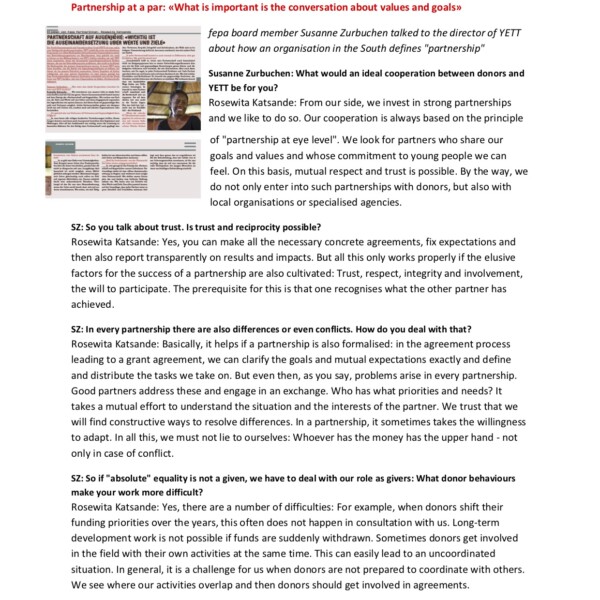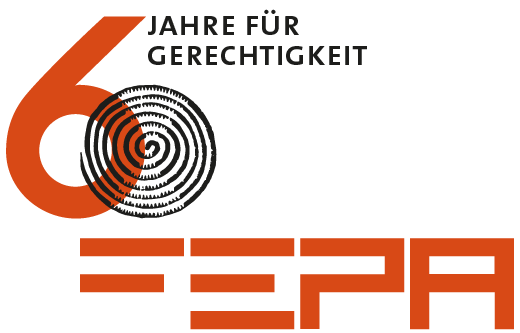Responsible communication on international cooperation
fepa moves ahead

Under the umbrella of Alliance Sud, a manifesto of Swiss aid organisations for “responsible communication of international cooperation” was created in 2020. fepa is also concerned with the question of how we fulfil our responsibility in communication, as formulated in the manifesto: “Responsibility for the people who improve their livelihoods thanks to cooperation, and for those who show solidarity”. Our communication should contribute to a better understanding, more solidarity as well as to the “decolonisation of aid”.
On 9 September, around 40 Africa experts discussed excerpts from fepa’s newsletters at the first “Critical Reflection Day” at the Centre for African Studies Basel.
The discussion showed that communication about cooperation is complex and can produce misunderstandings. It sharpened our understanding of colonial traditions of representation and that communication about “aid” ultimately depends on how these aid structures are shaped: Every inequality in the partner relationship also leads to problems in communication. We cannot and must not whitewash these inequalities. “Responsible communication” therefore also requires “responsible partnership” at eye level. You can find our reflection on the feedback below.
That is why the office is currently working on the following tasks:
- As an engaged, flexible and courageous organisation, we are moving forward experimentally and testing new, decolonised forms of communication. In this way, we ourselves contribute to the learning process around the Manifesto. We set ourselves the goal of exceeding the requirements of the “Manifesto”.
- We rely on critical engagement and co-determination by our partners for our communication and finance corresponding activities on the part of the partners.
- We are expanding the platforms where our partners and generally people from the Global South speak and write directly.
- We develop an integrated strategy for partnership project work, which includes communication.
- We enable partners to engage in the aid decolonisation debate.
- We sensitise our readers, members, supporters and donors to engage with their ideas, positioning and to listen even more to voices from the South.
- We define our roles more precisely. When fepa presents itself as an “expert”: for what? And what does this mean for the partners and beneficiaries?
Workshop Critical reflection day…
We submitted a number of fepa journal articles to a review by academic audience with the questions how we portray partners and relationships – in light of the importance to communicate responsibly and not least, to contribute to the decolonization of ‘aid’. You can read more about that background in the transcript. below.
7 groups discussed 4 text samples, representing different formats (Textsorten). The feedback was very critical and highlighting a range of issues where changes in approach are advisable. Sometimes the critique in the workshop suffered from a lack of contextual knowledge: the choice of single texts did not allow to see how they played together with other parts of the communication. But I, as the director of fepa, am convinced: the verdict must be taken seriously and changes applied.
The fepa-Mitteilungsblatt has a history rooted in how this genre of publications grew – and it will profit from a reform in some of its parts. Many of the shortcomings are not a problem of fepa, rather of the genre. It was fascinating to see how much is wrong with international cooperation communication, when you look at it from an abstract and academic viewpoint.
Here are some conclusions for fepa:
- First voice given to partners as authors: interviews were criticized for remaining in the donor/recipient set up; choice of extracts from statements were criticized for inability to overcome colonial representations – this will need resources at our partner’s end. And we must accept that some things are out of control, when people represent themselves.
- Editing must become a partnered approach – this will need resources at our parnter’s end.
- More of a journalist approach needed? – The genre is more PR with documentation and some first voice. Could a stronger outsider journalism approach, change representation and allow for more critical assessments?
- Multimedia approach to be adopted, so that background information, context, or even the way people talk and act can be transported – or discussion made visible.
- Representation of ‘recipients’ as ‘poor’ remains a big challenge. How to make them active? More and longer portraits? Life-stories? But should everyone be made a public story?
- Some statements by fepa director in editorials show ‘speaking for’ rather than just giving space to speak in own, direct voice.
- We are portraying fepa, especially in the communication leaning towards fundraising, as ‘we are the experts’ – but it creates power imbalances and makes people look passive. Is this a challenge when working with grassroots people: that they are ‘experts’ for what – how do we really portray them as subjects in a solidarity relation?
- In general it is very difficult to bring us, as ‘donors’ in the global North into the equation – unless we are brutally honest and transparent. Maybe we should not pretend that we are equal. Some participants suggested that we be more explicit about ‘collaboration’ between people with different roles and powers, and expertise, rather than aspiring to a partnership of equals.
- How can our partners speak truth to our power? There was a deep uneasiness within the academics about this. This is complicated by the reality that almost any ‘development-project’ set-up has a tendency to disempower partners in the south in a substantial way, unless they have unlimited and direct access to the funding partners in the north. Must we be prepared to adopt a position of ‘fund generously’ as a solution.
- Should we drop the editorial – together with the fundraising letter it is simply too much talking about our being good? Even though responses by readers show that the editorial is important to them. This shows the challenge how do we build trust in fepa – trust that we need for fundraising efficiently? How can we communicate so that this trust is easily extended to our partners? Should we hand over the editorial to a partner in the south?
- Apply a more robust approach at translation, circulation, copy rights etc.
Workshop Introduction by Marcel Dreier, Transcript
If today we as fepa challenge ourselves, each day, to think about how we can decolonize, this is part of our very own history and reason for existence. But it is also because we understand that the international cooperation, including our own, is rooted in colonial histories and discourses.
Our constitution says that we are actively playing a part in informing our members and audience about the politics of development and the situation and context in which our partners are active. Even though we are small as an organisation, we are still talking to some two thousand people or more in Switzerland who believe that we are a credible source of information and a good example of international cooperation practice. Many see us as ‘experts’. With this influence comes responsibility.
As experts we know that we must decolonize international relations and cooperation. And this debate is gaining some traction recently. One example is the Kampala Initiative.
)) That initiative aims to decolonize health cooperation, decolonize the critique of aid, and to decolonize the promotion of solidarity. It goes beyond the health sector, and asks: ‘How do we achieve real cooperation and solidarity within and beyond aid?’. Another example is the report on a global consultation held in 2020 with 158 activisits from around the global. This report is published by peace direct under the title “Time to Decolonise Aid”. It states that ‘some of the language used in the aid system reinforces discriminatory and racist perceptions of non-White populations’ and it challenges to acknowledge structural racism and the hegemony of Western values in international cooperation, and recommends to do something against it. One of the recommendations is to mind our language.
For such initiatives ‘decolonization’ is not ‘disengagement’. I also believe that the relations that we have with people in the global south are essential to build our humanity, our one world. So this session is not meant to be a fundamental critique of the idea of global cooperation – but wants to look at how we communicate about our relations, how we portray our partners in these relations and whether we mind our language in view of colonial histories and discourses.
A group of larger Swiss INGOs in 2020 presented a ‘manifesto for responsible communication on international communication.’ This manifesto steers clear of the word ‘decolonize’. fepa takes the manifesto as our starting point, and minimum requirement, for our communication. Actually, I feel, also because we are not really par of ‘the industry’, but driven by grassroots here, that we should aim to try to be voice in this debate, a debate about decolonizing and working towards, unlocking international communication from colonialism. So we felt that we should submit our own communication to your critique here, even though the communication of others have a much greater influence. I am grateful that you are willing to spend some time and appreciative of your feedback.
Are you willing to participate in our debates? Please get in touch with Marcel Dreier (marcel.dreier@fepafrika.ch).
